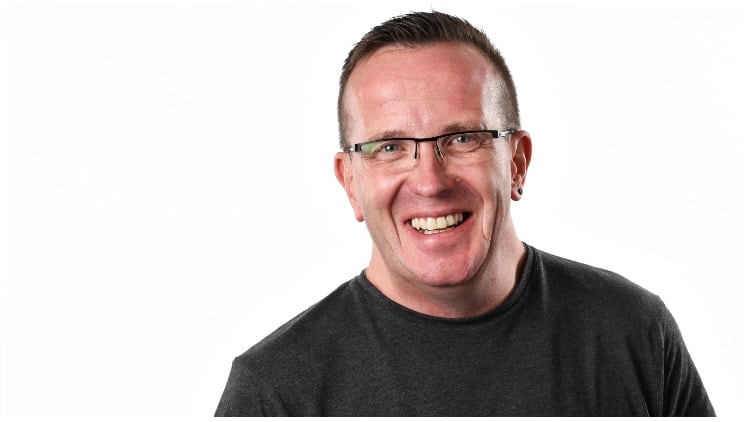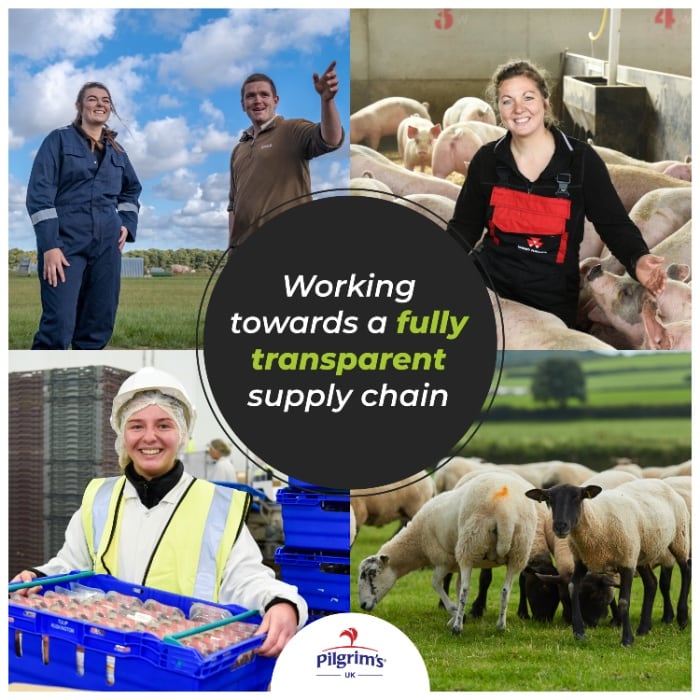I’ve been with Pilgrim’s UK for seven years now. Before then, I held various roles centred around ethical trade and human rights, and really cemented this passion during my time working on the Bangladesh Accord on Fire and Building Safety. This involved collaborating with NGOs, trade bodies, retailers, and brands up and down the supply chain to agree policy that has helped to ensure proper due diligence around human rights in the garment industry.
This then led me to look deeper into supply chains at tanneries and cotton mills across India, Sri Lanka, China and Myanmar, which triggered my next move into the Co-op Food as an ethical trading manager for the protein, non-food and produce business.
I was lucky enough to find my purpose and establish my career path; for me, it was important I work with a company that values the importance of human rights and ethics as much as I do, and where I can work with businesses and people from all different backgrounds towards a joint purpose.
I joined Pilgrim’s UK in 2017, starting out as a responsible sourcing manager. I’m now working across the business as a human rights manager bringing together expertise, adding insight and gaining views from all areas of our supply chain to understand the challenges and help shape a better future for all involved.
A business and industry wide ‘team’
Collaboration is key in helping to shift the dial and really lift the lid on the pork and lamb supply chain, which is why my ‘team’ is less defined than most. I work with departments across Pilgrim’s UK including agriculture, procurement, and leadership executives, as well as third party organisations, NGOs, farmers and retailers. This means we can bring together insight, learnings and value from different areas of the business and industry to forge an approach that benefits the entire supply chain from farm-to-fork in a non-competitive area. I form part of the sustainability team which is made up of subject matter experts in all areas of sustainability.
Challenges in the supply chain and the wider industry
We’ve been working hard to ensure high human rights standards across our supply chain and have been continually improving over the last 40 years.
However, like so many big food companies, a large percentage of our valued and skilled colleagues come from overseas, and we create thousands of temporary roles for agency workers at peak times too.
It’s well-known that negative perceptions around the meat industry and its sustainability credentials – whether environmental or social – exist, but the picture painted isn’t always accurate and like many businesses we’re working hard to reverse that trend and better educate people on the current state-of-play.
The best way to achieve that? Total transparency.
Food supply chains need to operate in a more transparent way, from the handling of animals, and – crucially – to the management of people.
We’ve already implemented industry leading initiatives, ensuring farmers are paid fairly. During the Covid pandemic, Pilgrim’s UK, Co-op and Waitrose continued to purchase animals and pioneered the use of a cost production payment model.
But it’s clear we need to and will go further.
The Human Rights Impact Assessment (HRIA) was the next logical step to go further than we, or any other business in the sector, had done before, working with dedicated teams across our key partners at Co-op and Waitrose towards a shared vision of a fully transparent and ethical supply chain.
The idea was born from a human rights risk assessment I carried out and presented to the Pilgrim’s UK leadership team, which followed the UN Guiding Principles on Business and Human Rights. This identified higher risk area within the supply chain, with the key next step being a detailed HRIA with our trusted retailer partners and suppliers to help us better understand our impact.
First-of-its kind Human Rights Impact Assessment
As agricultural livestock systems can be very complex, supply chain transparency can be very tricky to achieve. But our unique position as both a supplier and a producer meant we could undertake a HRIA that presents huge benefits to the wider industry and other supply chains.
Before this, HRIAs that have been conducted globally had only focused on high-risk commodity supply chains, outside of the UK, such as coffee, sugar, and cocoa. Whereas, this HRIA has helped all three businesses gain a deeper understanding of how our practices are affecting farmers, workers and other stakeholders working in the pig and lamb supply chains within the UK.
Not only will this help all involved push forward towards our shared ambition of a fully transparent supply chain, but it shines a light on what’s working well within our business’ ethical network of producers, factory workers and suppliers, while highlighting areas for improvement and potential risks that may be prevalent in other agricultural supply chains in the UK – and beyond.
Collaborating across the industry
The HRIA is people focused, which means collaboration is key to its success! Human Rights are impacted by all businesses right down the supply chain.
Working with our retail partners, Co-op and Waitrose, allowed us to unlock the best innovation and most effective, collaborative approach. We also brought Impactt onboard to carry out on-site assessments across abattoirs, processing sites (all owned by Pilgrim’s UK), and integrated Pilgrim’s UK producers, independent pig producers and independent lamb producers. This was really key for me as it highlighted the interconnecting dependency of the meat processing supply chain and ensured a complete deep dive down the supply chain.

As part of the HRIA, Impactt engaged a representative sample total of 127 people from across the supply chain, from workers and producers to site management teams, retailers and NGOs. I worked closely with dedicated teams across different departments within Pilgrim’s UK, Waitrose and Co-op to align on approach, responsibilities and actions to ensure not just the delivery of this large-scale assessment but to bring out its true value in driving real change.
This meant working collaboratively through assessments and interviews across Pilgrim’s UK, Co-op and Waitrose’s commercial, technical and agriculture teams.
Physical visits to processing units, abattoirs and farms and document review of employment contracts, pay and hour records, and grievance logs were also carried out to further understand the impact of purchasing practices and business relationships on workers. To ensure workers where comfortable with this, leads from the Pilgrim’s UK agricultural team accompanied Impactt on-site.
The HRIA methodology was informed by expertise in human rights, including the United Nations Guiding Principles (UNGPs), and by the Danish Institute for Human Rights framework, which is widely accepted as the most practical framework available. It interprets all the relevant legislation, to give a more detailed but focused result on the human touchpoints of the supply chain, which really sets it apart.
This helped us create a HRIA designed to identify any negative human rights impacts on key rights-holders, workers and farmers in the pork and lamb supply chains resulting from Pilgrim’s UK, Co-op and Waitrose’s business activities and relationships.
The future of the F&B supply chain
It was fantastic to find that the assessment recognised lots of positive impacts and good practices, which can be implemented further across the industry and beyond.
Positively, the measures and controls in place across all three businesses are having a positive impact, and most of the issues raised are sectoral issues that we will work collaboratively to solve. It was good to see that many of the controls we have in place to protect human rights – which go beyond legal requirements and are industry-leading – had worked well.
Overall, there is a strong understanding of the signs of modern slavery and processes in place to ensure confidential and safe reporting of any concerns across sites, including the business’ modern slavery incidence response teams based across all sites, in partnership with Slave Free Alliance. This is key; only with both processes in place to deal with and provide a direct line to report concerns, can we tackle the risk of modern slavery on site.
However, even in Pilgrim’s UK’s supply chain, we know there is still some way to go and there are opportunities for improvement.
What’s next for Pilgrim’s UK human rights work?
The assessment was effective at highlighting the good and the bad, but of course, the most important step is what will be done about it!
In response to the findings, and as part of our Human Rights Action Plan, all three businesses have publicly published the report and a detailed action plan, to increase transparency, show a commitment to continuing to champion human rights and improving standards further across the pork and lamb supply chain.
The initial action plan flagged a key learning for us – a need to be clearer on what the outputs must look like and ensure a greater understanding of the sector landscape. For example, there’s not much point in concentrating on policies and procedures at farms run by sometimes only three people, this needs a bespoke approach given there’s not a specific need for this.
We’re also carrying out gap analyses on training needs required at sites and farms, alongside updating our employee handbooks into ‘plain English’ which will then be translated into multiple languages to support migrant workers. Ongoing unannounced worker welfare visits will also continue to take place throughout the year to ensure high human rights standards are maintained.
So much work from my colleagues and teams from far and wide has gone into this HRIA and it’s important that we be fully transparent in not just our supply chain but in our reporting of the findings and the next steps. Pilgrim’s UK, Co-op and Waitrose will publicly report progress on the action plan. This robust action plan will hold each party to account, ensuring that real, tangible changes are made throughout the supply chain to better improve the lives of impacted communities.
To go further, this process can be scaled up and rolled out across multiple sectors – in the UK and globally – to drive the focus on people at all levels of the supply chain to level the playing field within the food industry.
We’re already engaging with other retailers about their pork supply chains and how a HRIA can benefit – doing this across the industry is how we will create systemic change for the good. We can’t do all this alone; industry-wide change requires industry wide collaboration. These issues require industry level discussion and implementation across the meat sector and the wider agricultural sector in partnership with other processers and producers, and other affected stakeholders such as the National Farming Union (NFU) and Food Network for Ethical Trade (FNET).
Even though we've got some way to go, I'm proud of what we've achieved so far and am looking forward to working with our retail partners, colleagues at our manufacturing sites and pig and lamb farmers to making real progress together towards a fully transparent and ethical supply chain.
You may also be interested in reading: Why should I be concerned about ESG? in this Food Manufacture exclusive column.




